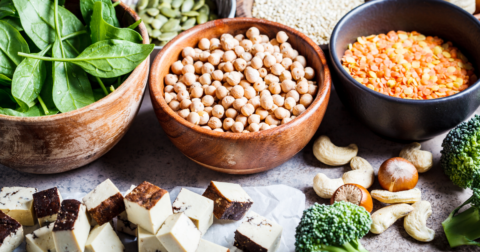News
RFK Jr.’s New Dietary Guidelines Tout Meat, but They Could Actually Open the Door for More Plants in School Lunches
Diet•8 min read
Explainer
The answer depends on your age and situation, but in general, most people are worried about the wrong nutrient.


Words by Seth Millstein
It’s no secret that protein is one of the most important parts of our diets, but beyond that, things can get confusing. There are different kinds of protein, different sources of protein, and different ways that protein can be manufactured. All of these factors, along with your individual health medical history, play a role in determining whether you’re consuming protein in a healthy manner. But for most of us, the most pertinent question is a much simpler one: how much protein do you need to be healthy?
This isn’t as simple of a question as it might seem, and in order to answer it, we first need to talk a little bit about what protein is, how it’s made and what it does.
Proteins are a versatile type of nutrient that the body needs to survive. There are over 10,000 different kinds of proteins that serve all types of functions, but for simplicity’s sake, they’re usually grouped into seven categories. These categories are:
As the above list suggests, proteins play a number of different roles in the body. There are proteins that rebuild muscle, proteins that digest food, proteins that fight illnesses, proteins that regulate our metabolism and so on. Without proteins, human life wouldn’t be possible.
To fully understand proteins, it’s important to understand amino acids as well, as they are the building blocks from which protein is made.
There are 20 different kinds of amino acids that the human body needs, and when combined in different ways, they create different kinds of proteins. Although the human body can create some of these acids internally, there are nine that can only be obtained through food. These are known as the “essential amino acids.”
You may have heard people reference foods that are “complete proteins” or, alternatively, “incomplete proteins.” This is a reference to amino acids; foods that contain all of the essential amino acids are called complete proteins, while those that don’t are called incomplete proteins. Rice alone does not contain enough of the amino acid lysine to be a complete protein for instance, but eating beans or lentils — which are higher in lysine — with rice will provide a complete protein package.
In the most literal sense, the biggest benefit of eating protein is that you get to stay alive. The human body can’t survive without protein, as most of its essential functions require various different proteins.
More generally, ensuring that you eat a healthy amount of protein has a number of health benefits. Among other things, protein:
In short, eating sufficient protein keeps your body functioning properly and feeling good.
Nutritionists and physicians generally recommend that if you are under age 50 or so, you eat .36 grams of protein every day for every pound that you weigh. This is true regardless of one’s gender. So, for example, someone who weighs 150 pounds should aim for about 54 grams of protein a day.

If you’re younger than 50, you probably don’t need to worry about getting enough protein. Not because it isn’t important, but because in all likelihood, you’re already getting enough protein. Multiple surveys have found that globally, the majority of people already eat more protein than they need to. A study of data from 2003-2004 found that as many as 97 percent of people exceed the recommended daily intake of protein.
However, a recent study found that adults over 50 are significantly more likely to be protein deficient, and that the odds of protein deficiency increase with age. Most notably, 46 percent of adults over the age of 70 don’t get enough protein, the study found. Across all adults over 50, women are more likely to be protein deficient than men.
If you’re going to worry about not getting enough of a nutrient, that nutrient should be fiber, not protein. A 2021 survey found that 88 percent of women and a staggering 96 percent of men in America don’t eat enough fiber every day. That’s a big problem, as fiber helps prevent diabetes, colorectal cancer and heart disease. One 2019 metaanalysis found that people on high-fiber diets are 31 percent less likely to die of coronary heart disease.
Getting enough protein is absolutely crucial. But statistically speaking, you’re far more likely to be deficient in fiber than protein. A good way of making sure that you’re getting enough of both is to get your protein from plants instead of animals: Plants are full of fiber, while meat contains absolutely no fiber whatsoever.
While you’re unlikely to be protein deficient, you may need more or less protein depending on your circumstances.
Pregnant people require more protein to feed the fetus growing inside of them. The general recommendation is that pregnant people get 75-100 grams of protein a day; if you’re pregnant, however, it’s highly recommended to consult with your doctor to determine what protein level suits your body’s specific needs.
You should increase your protein intake as you get older, due to the natural reduction in muscle mass that occurs as you age, a process known as sarcopenia. Though it varies from person to person, the Mayo Clinic recommends that adults between the ages of 40 and 50 start consuming between .45 and .54 grams of protein for every pound of body weight.
People who exercise regularly are also advised to eat a bit more protein — between .49 and .68 grams per pound of body weight a day, according to the Mayo Clinic — in order to rebuild the muscle mass destroyed during workout.
There are some rare situations in which one may be advised to eat less protein than the recommended amount. This can be the case for people with decreased kidney or liver function, for instance. However, low-protein diets are actively harmful to those who don’t need to be on them, so it’s absolutely crucial to consult with a physician before contemplating one.
Protein deficiency is no joke. The following symptoms are all signs that you may not be getting enough protein in your diet:
This is a very eclectic list of symptoms, which just goes to show how many of our bodies’ different systems rely on protein to function.
Yes! Although we need protein to survive, it’s always possible to have too much of a good thing. Studies have shown that eating more than the recommended amount of protein can decrease bone density, leading to a higher risk of bone fractures. It can also lead to hypercalciuria, or excessive calcium in the urine, which in turn can result in kidney stones.
Even more seriously, several studies have also found that eating too much protein increases one’s risk of developing cardiovascular disease — the number-one cause of death in America — and various forms of cancer. However, these more serious risks are largely associated with consuming protein from red meat, as opposed to plants. Studies haven’t shown any increased health risks from consuming plant-based protein as opposed to protein from animals.
Many people mistakenly believe that meat is the best way to get protein, but it isn’t. This misconception may stem from the fact that most meats contain all 9 essential amino acids, making them a convenient way to get all of the amino acids you need.
Although some plants aren’t complete proteins like meat, plenty of them are. The following plant-based foods contain all 9 essential amino acids:
In addition, some plants are incomplete proteins, but still good sources of protein regardless. They include:
It’s worth mentioning that you also combine multiple incomplete proteins and get the equivalent of a complete protein. For instance, while neither rice nor beans are complete proteins unto themselves, they become a complete protein when eaten together (as they commonly are).
It’s entirely possible to incorporate complete proteins into your diet without ever touching an ounce of meat — and you don’t have to shovel beans into your mouth every waking second of the day in order to do it. With a little bit of planning and preparation, getting enough protein from a plant-based or vegan diet is entirely doable. Here’s a day-by-day guide to get you started.
Relying on meat for protein introduces a host of other risks that stem from meat consumption specifically.
Humans already eat more meat than we need to; between 1961 and 2020, the average yearly meat consumption in high-income countries rose by nearly a third. However, many studies have shown that eating meat increases the risk of obesity, cancer, high blood pressure, high cholesterol and heart disease.
On the other hand, adopting a plant-based diet can reduce all of these risks while still providing all the protein you need to get by.
Many people incorporate supplements into their diet to ensure a healthy amount of protein. Protein supplements generally come in two varieties: Those that are derived from plants, and those that are derived from animals. Animal-derived protein supplements include:
However, a 2020 study found that relying on plant-based protein instead of animal-based protein can reduce your risk of cardiovascular disease, so if you’re looking to take protein supplements, those that come from plants may be a safer bet. Some of the more popular plant-derived protein supplements include:
Many vegan and plant-based supplements use multiple sources of protein. Garden of Life, for instance, sells a protein powder that combines protein from peas, navy beans, cranberries, garbanzo beans and lentils. There are also bespoke protein supplement companies, like Gainful, that create custom protein powders for customers based on their individual health profiles and goals.
There are some risks to relying on supplements for protein, however. Many protein powders contain harmful toxins, including heavy metals and pesticides, that are linked to cancer and other negative health outcomes. They also aren’t regulated by the FDA, meaning that manufacturers themselves are responsible for ensuring their safety.
Protein is a more complex topic than it may seem at first glance, but given how important it is to our wellbeing, it’s well worth knowing about. There are still many misconceptions about it, such as the idea that we can only get enough “good” protein from meat and animal products. But that’s not the case, and in fact, there are compelling health-based reasons to seek out protein from plants rather than animals.